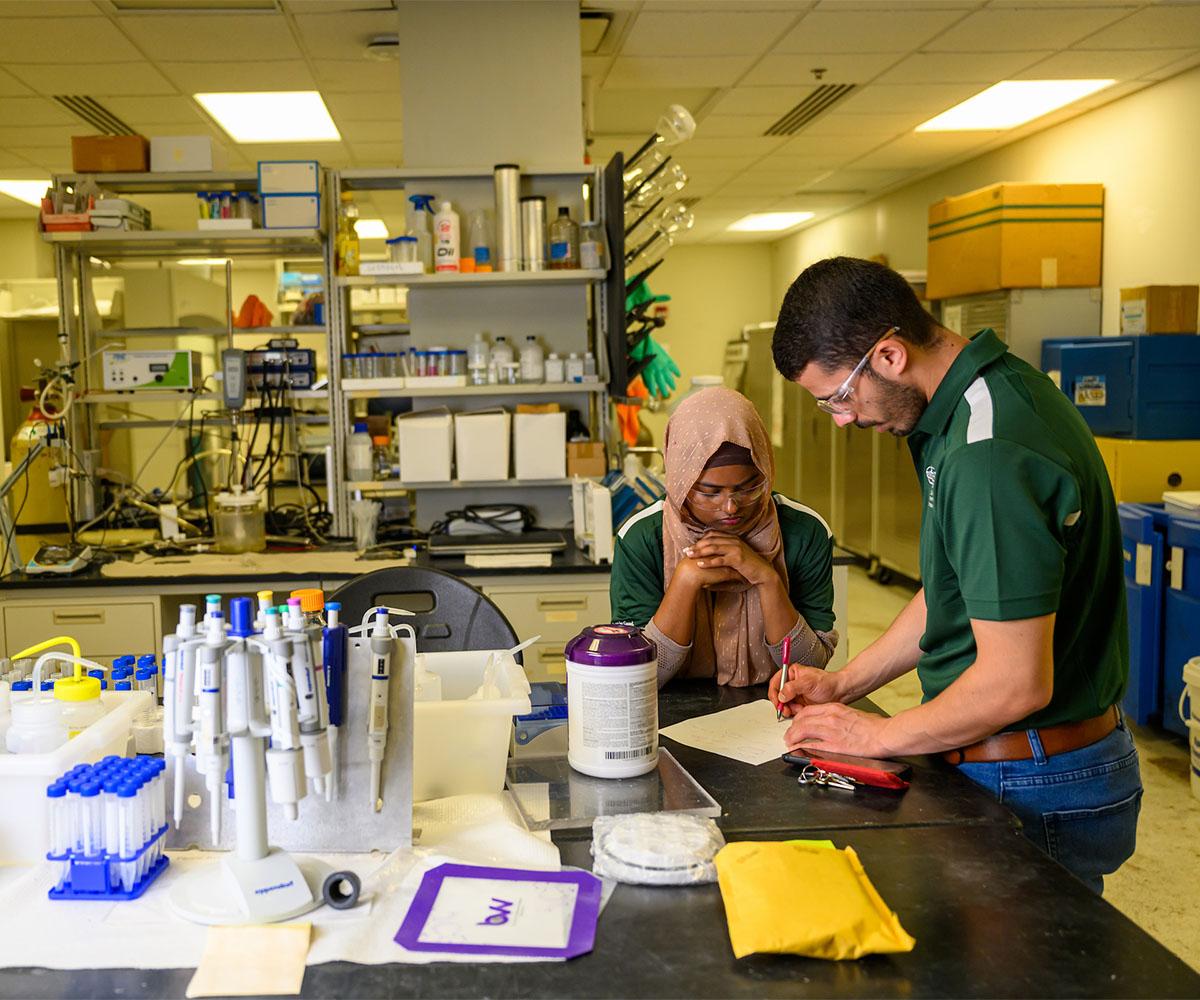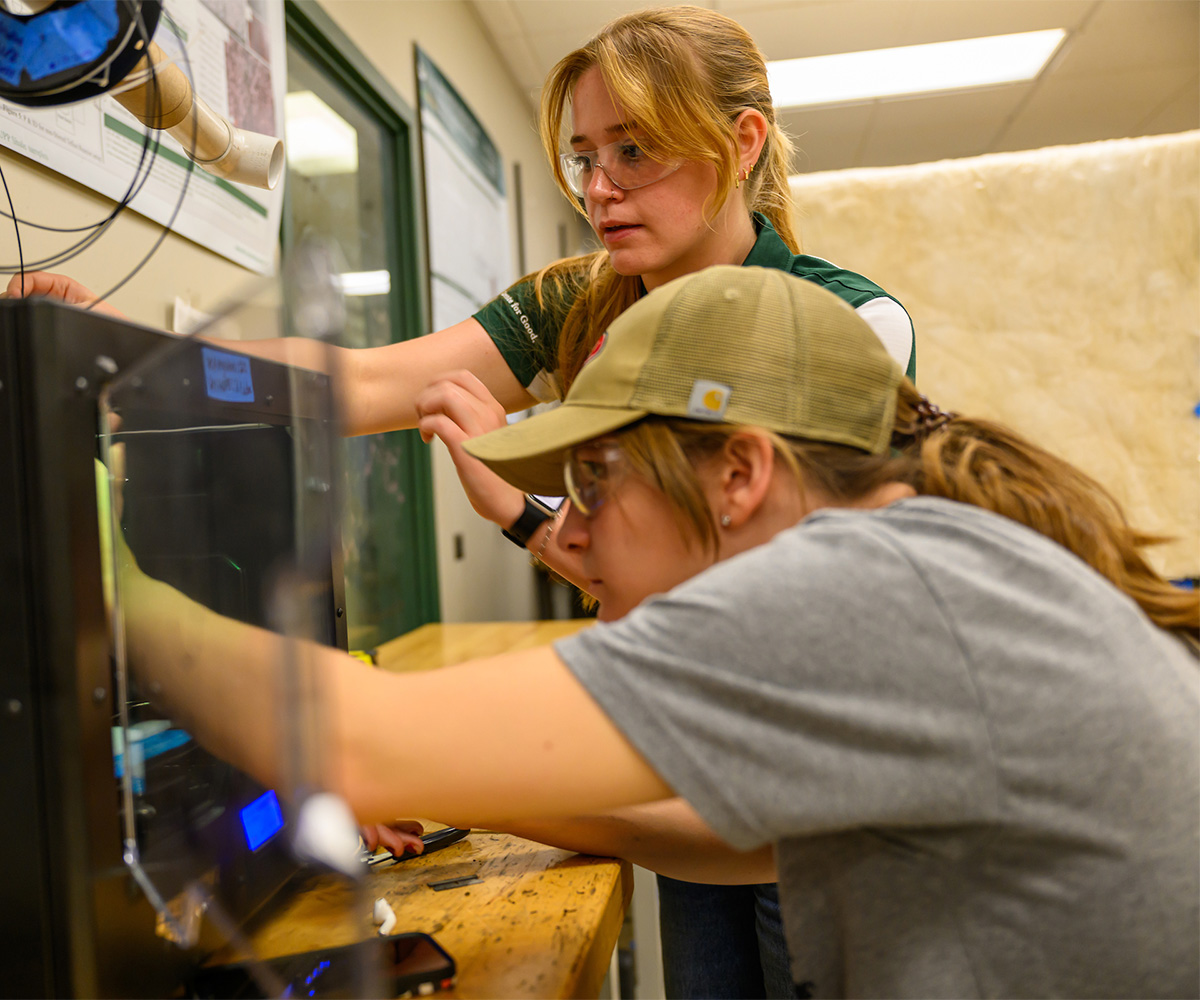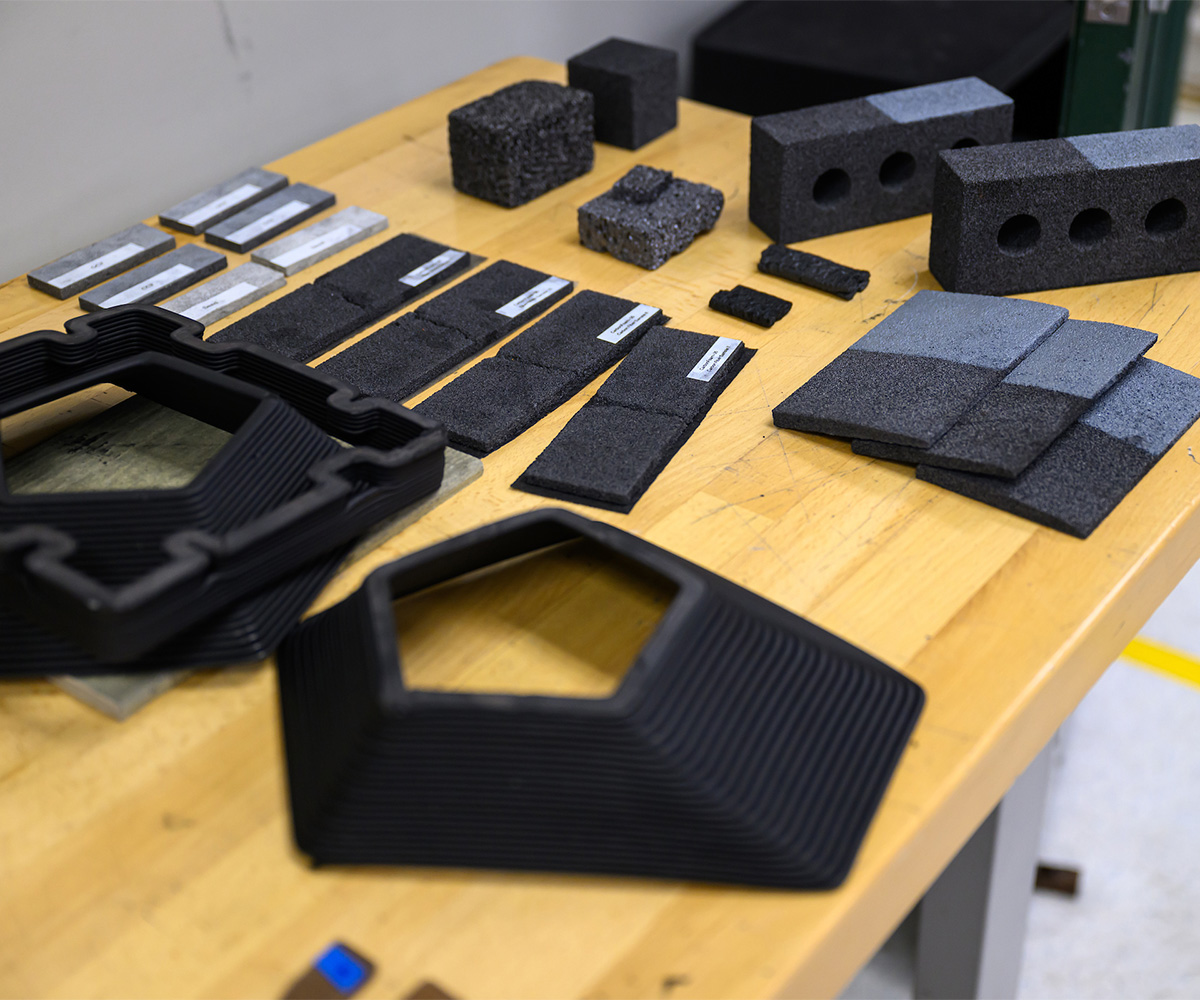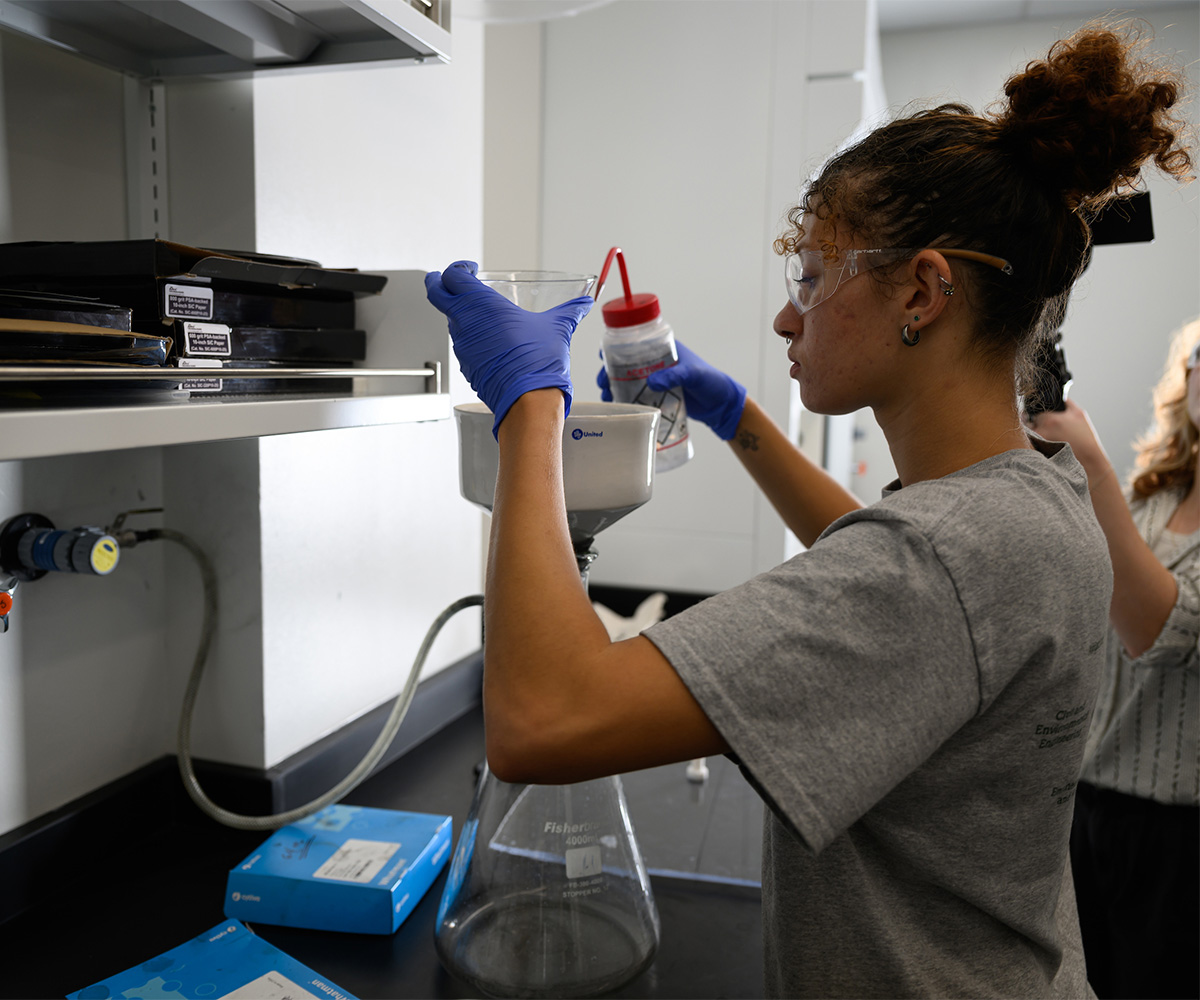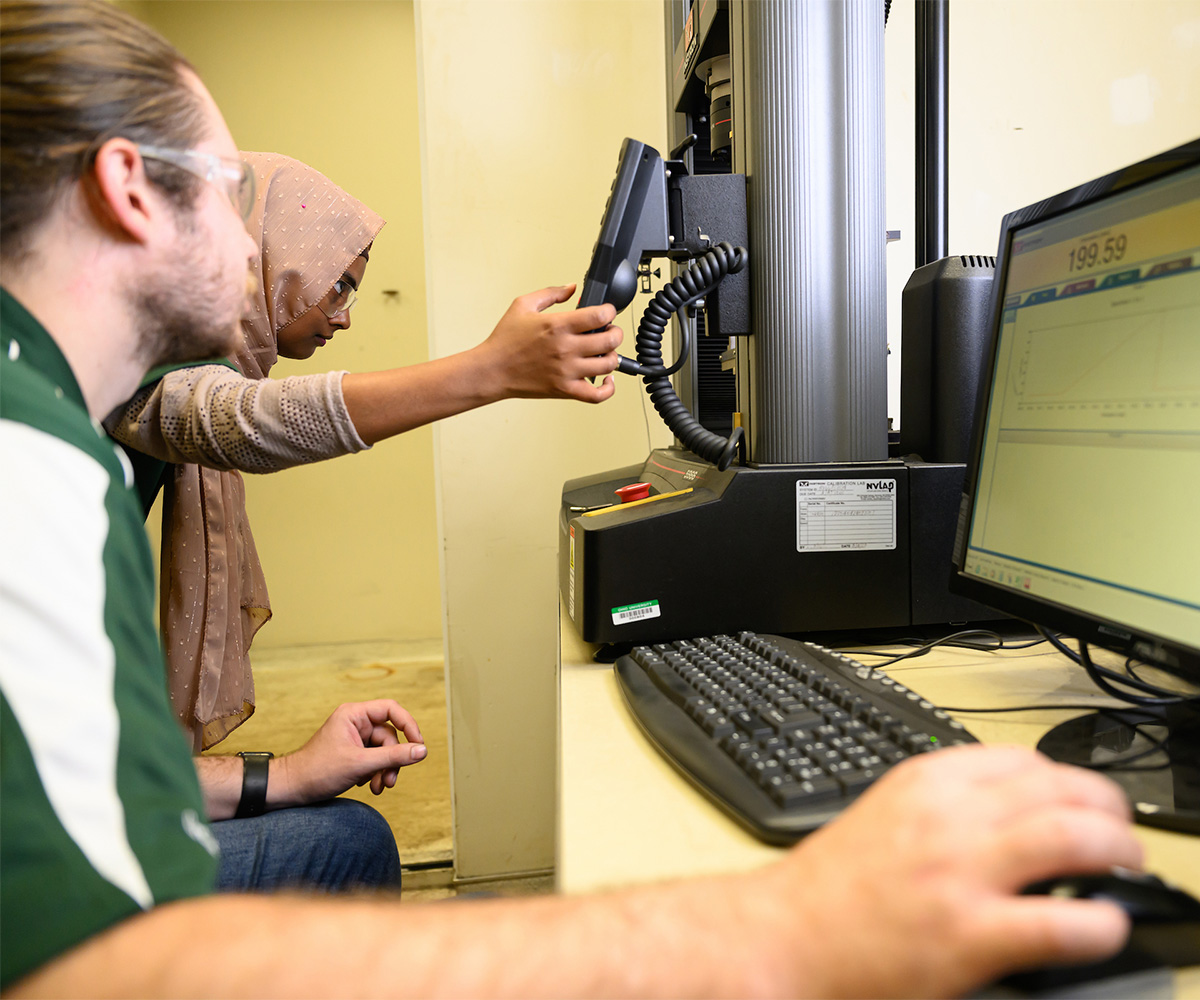A strategic research area for OHIO and the Russ College, the field of energy and the environment is a primary global concern, especially within the context of mega-trends such as population growth, climate change, and urbanization. ISEE students, faculty, and staff are developing applied, economically viable solutions for partners in industry, government, and academia.
ISEE offers capabilities including:
- Thermochemical and electrochemical process R&D
- Applied research and development of advanced materials
- Support for advanced manufacturing research and development
- Environmental remediation on multiple fronts
- Process Simulation
- Techno-Economic and Lifecycle Analyses
Research Areas
Our partners recognize our key competencies and have supported our work to develop innovative technologies in the following areas:
Selected Peer-Reviewed Publications
ISEE researchers extensively publish their research in peer-reviewed journals and present their work at national and international conferences. Review selected peer-reviewed publications broken down by decade on this page.
Additionally, you can visit the ISEE Affiliate Faculty and Student page and click on a faculty member's profile to view their publications and presentations.
2021-Present
- Nepal, K., Ugwumadu, C., Kraft, F., Al-Majali, Y., Drabold, D. (2025). The effects of crystal orientation and common coal impurities on electronic conductivity in copper–carbon composites. Carbon; 231: https://api.elsevier.com/content/abstract/scopus_id/85207208268 .
- Tanim, T., Bayless, D., Trembly, J. Modeling of a 5 kWe tubular solid oxide fuel cell based system operating on desulfurized JP-8 fuel for auxiliary and mobile power applications.. Journal of Power Sources; 221: 387-396. http://www.journals.elsevier.com/journal-of-power-sources/ .
- Ugwumadu, C., Downs, W., O'Brien, C., Thapa, R., Olson, R., Wisner, B., Ali, M., Trembly, J., Al-Majali, Y., Drabold, D. (2024). Atomistic-to-continuum modeling of carbon foam: A new approach to finite element simulation. Carbon; 229: https://api.elsevier.com/content/abstract/scopus_id/85200976450 .
- Ugwumadu, C., Drabold, D., Smith, N., Trembly, J., Olson, R., Shereda, E., Al-Majali, Y. (2024). The structure of appalachian coal: Experiments and Ab initio modeling. Carbon; 225: https://api.elsevier.com/content/abstract/scopus_id/85189859336 .
- Abu Hajer, A., Daramola, D., Trembly, J. (2024). Carbon dioxide reduction in solid oxide electrolyzer cells utilizing nickel bimetallic alloys infiltrated into Gd0.1Ce0.9O1.95 (GDC10) scaffolds . Electrochimica Acta.
- Ugwumadu, C., Thapa, R., Nepal, K., Gautam, A., Al-Majali, Y., Trembly, J., Drabold, D. (2024). Self-Assembly and the Properties of Micro-Mesoporous Carbon. 4 . Journal of Chemical Theory and Computation; 20: 1753-1762. https://api.elsevier.com/content/abstract/scopus_id/85179242859 .
- Ugwumadu, C., Olson, R., Smith, N., Nepal, K., Al-Majali, Y., Trembly, J., Drabold, D. (2023). Computer simulation of carbonization and graphitization of coal. 9 . Nanotechnology; 35: https://api.elsevier.com/content/abstract/scopus_id/85179254060 .
- Al-Majali, Y., Alamiri, E., Wisner, B., Trembly, J. (2023). Mechanical performance assessment of sustainable coal plastic composite building materials. 1 . Journal of Building Engineering; 80: 108089.
- Veley, L., Chinonso, C., Trembly, J., Drabold, D., Al-Majali, Y. (2023). 3D Printing of Sustainable Coal Polymer Composites: Study of Processing, Mechanical Performance, and Atomistic Matrix–Filler Interaction. 11 . ACS Applied Polymer Materials; 5: 9286–9296.
- Kasick, A., Abu Hajer, A., Velraj, S., Daramola, D., Trembly, J. (2023). Electro-Oxidative Dehydrogenation of Ethane to Ethylene Using Lanthanum-Strontium-Iron Oxide Perovskite Electrocatalysts. 10 . Journal of the Electrochemical Society; 170: 104509.
- Abu Hajer, A., Velraj, S., Daramola, D., Trembly, J. (2023). Carbon dioxide reduction in solid oxide electrolyzer cells using transition metals infiltrated into Gd0.1Ce0.9O1.95 (GDC10) scaffolds. Journal of Power Sources; 572: 233040.
- Ugwumadu, C., Thapa, R., Al-Majali, Y., Trembly, J., Drabold, D. (2023). Formation of Amorphous Carbon Multi-Walled Nanotubes from Random Initial Configurations. 3 . Physica Status Solidi (B) Basic Research; 260: https://api.elsevier.com/content/abstract/scopus_id/85145744028 .
- Ugwumadu, C., Nepal, K., Thapa, R., Lee, Y., Al Majali, Y., Trembly, J., Drabold, D. (2023). Simulation of multi-shell fullerenes using Machine-Learning Gaussian Approximation Potential. Carbon Trends; 10: https://api.elsevier.com/content/abstract/scopus_id/85144596313 .
- Thapa, R., Ugwumandu, C., Nepal, K., Trembly, J., Drabold, D. (2022). Ab Initio Simulation of Amorphous Graphite. Physical Review Letters; 128: 236402.
- Almajali, Y., Forshey, S., Trembly, J. (2022). Effect of Natural Carbon Filler on Thermo-oxidative Degradation of Thermoplastic-based Composites . Thermochimica Acta; 713: 179226.
- Almajali, Y., Trembly, J. (2022). Flammability and Thermal Stability of Thermoplastic-based Composites Filled with Natural Carbon. 3 . Journal of Fire Sciences; 40: 175-193.
- Almajali, Y., Forshey, S., Trembly, J. (2022). Effect of Natural Carbon Filler on Thermo-oxidative Degradation of Thermoplastic-based Composites . Thermochemica Acta.
- Pindine, G., Trembly, J., Daramola, D. (2021). Equilibrium-based Temperature Dependent Economic Analysis of Phosphorus Recovery from Different Wastewater Streams via Chemical Precipitation. 11 . ACS ES&T Water; 1: 2318-2326. http://dx.doi.org/10.1021/acsestwater.1c00166 .
- Velraj, S., Daramola, D., Trembly, J. (2021). A novel solid oxide electrolytic cell with reduced endothermic load for CO2 electrolysis using (La0.80Sr0.20)0.95MnO3-δ cathode . Journal of CO2 Utilization; 48: 101527. http://dx.doi.org/10.1016/j.jcou.2021.101527 .
- Able, C. (2021). The system CaCl2-H2O: Thermodynamic Modeling and Flow Calorimetry experiments at elevated temperatures and pressures. Journal of Chemical & Engineering Data.
- Belarbi, Z., Daramola, D., Trembly, J. (2020). Thermodynamics and Bench-Scale Demonstration of Electrochemical Nutrient Reduction in Wastewater via Recovery as Struvite. Journal of the Electrochemical Society; 167: 155524. http://dx.doi.org/10.1149/1945-7111/abc58f .
- Blondes, M.S., Shelton, J.L., Engle, M.A., Trembly, J.P., Doolan, C.A., Jubb, A.M., Chenault, J.C., Rowan, E.L., Haefner, R.J., Mailot, B.E. (2021) Utica Shale Play Oil and Gas Brines: Geochemistry and Factors Influencing Wastewater Management. Environmental Science & Technology ; 54: pp 13917.
- Able, C.M. and Trembly, J.P. (2021) The System CaCl 2 –H 2 O: Thermodynamic Modeling and Flow Calorimetry Experiments at Elevated Temperatures and Pressures. Journal of Chemical & Engineering Data ; 66: pp 1652.
- Velraj, S., Daramola, D.A., Trembly, J.P. (2021) A novel solid oxide electrolytic cell with reduced endothermic load for CO 2 electrolysis using (La 0.80 Sr 0.20 ) 0.95 MnO 3-δ cathode.(opens in a new window) Journal of CO2 Utilization ; 48: pp 101527.
- Belarbi, Z., Daramola, D.A., Trembly, J.P. (2020) Bench-Scale Demonstration and Thermodynamic Simulations of Electrochemical Nutrient Reduction in Wastewater via Recovery as Struvite.(opens in a new window) Journal of the Electrochemical Society ; 167: pp 155524.
2011-2020
- Able,C.M., Trembly, J. P. (2020). Advanced supercritical water-based process concepts for treatment and beneficial reuse of brine in oil/gas production.(opens in a new window) Desalination ; 481: p114333.
- Spencer, M., Garlapalli, R., Trembly, J. P. (2019). Geochemical phenomena between Utica-Point Pleasant shale and hydraulic fracturing fluid.(opens in a new window) AIChE Journal ; 2019: p16887.
- Al-Majali, Y.A., Chirume, C.T., Marcum. E.P., Daramola, D.A., Kappagantula, K.S., Trembly, J.P. (2019). Coal Filler Based Thermoplastic Composites as Construction Materials: A New Sustainable End-Use Application. ACS Sustainable Chemistry & Engineering ; 7: p16870.
- Belarbi, Z., Trembly, J. P. (2018). Electrochemical Processing to Capture Phosphorus from Simulated Concentrated Animal Feeding Operations Waste. Journal of the Electrochemical Society ; 165: pE685.
- Fan, W., Srisupan, M., Bryant, L., Trembly, J. P. (2018). Utilization of fly ash as pH adjustment for efficient immobilization and reutilization of nutrients from swine manure using hydrothermal treatment. Waste Management ; 79: p709.
- Garlapalli, R., Spencer, M., Alam, K., Trembly, J. P. (2018). Integration of Heat Recovery Unit in Coal Fired Power Plants to Reduce Energy Cost of Carbon-dioxide Capture. Applied Energy ; 229: p900.
- Able, C., Ogden, D., Trembly, J. P. (2018). Sustainable management of hypersaline brine waste: Zero liquid discharge via Joule-heating at supercritical condition. Desalination ; 444: p84.
- Chen, X., Tao, P., Li, T., Trembly, J. P., Liu, X. (2018). Zinc removal from model wastewater by electrocoagulation: Processing, kinetics and mechanism. Chemical Engineering Journal ; 349: p358.
- Dong, X., Trembly, J. P., Bayless, D. J. (2017). Techno-economic analysis of hydraulic fracking flowback and produced water treatment in supercritical water reactor. Energy ; 133: p777.
- Phillips, L., Kappagantula, K., Trembly, J. P. (2017). Mechanical Performance of Thermoplastic Composites using Bituminous Coal as Filler: Study of a Potentially Sustainable End-use Application for Appalachian Coal. Polymer Composites ; 40: p591.
- Fan, W., Bryant, L., Srisupan, M., Trembly, J. P. (2017). An Assessment of Hydrothermal Treatment of Dairy Waste as a Tool for a Sustainable Phosphorus Supply Chain in Comparison to Commercial Phosphatic Fertilizers. Clean Technologies and Environmental Policy ; 20: p1467
- Ogden, D., Trembly, J. P. (2017). Desalination of hypersaline brines via Joule-heating: Experimental investigations and comparison of results to existing models. Desalination ; 424: p149.
- Dong, X., Trembly, J. P., Bayless, D. J. (2017). Techno-economic analysis of hydraulic fracking flowback and produced water treatment in supercritical water reactor. Energy ; 133: p777.
- Lopez, D., Trembly, J. P. (2017). Desalination of Hypersaline Brines with Joule-Heating and Chemical Pre-treatment: Conceptual Design and Economics. Desalination ; 415: p49.
- Dasaard, C., Bayless, D. J., Stuart, B. (2016). Experimental Measurement of Total Inorganic Carbon Concentrations from Absorption of Gas Phase CO2. International Advanced Research Journal in Science, Engineering and Technology ; 3: p119.
- Dasaard, C., Bayless, D. J., Stuart, B. (2016). Saturated pH and Total Inorganic Carbon from CO2 Solubility Related to Algal Growth. International Advanced Research Journal in Science, Engineering and Technology ; 3: p146.
- De Silva, C., Garlapalli, R., Trembly, J. P. (2016). Removal of Phenol from Oil/Gas Produced Water Using Supercritical Water Treatment with TiO2 Supported MnO2 Catalyst. Journal of Environmental Chemical Engineering ; 5: p488
- Fan, W., Liberati, B., Novak, M., Cooper, M., Kruse Daniels, N., Young, D., Trembly, J. P. (2016). Radium-226 Removal from Simulated Produced Water Using Natural Zeolite and Ion-Exchange Resin. Industrial & Engineering Chemistry Research ; 55: p12502.
- Kuriger, R., Young, D., Mackenzie, M., Sarv, H., Trembly, J. P. (2016). Phase Analysis of Scale Deposition in Boiler Tubes Utilizing Steam-Assisted-Gravity-Drainage Produced Water. Journal of Thermal Science and Engineering Applications ; 9: p1.
- Bayless, D. J., Lunka, A. (2013). Effects of flashing light-emitting diodes on algal biomass productivity. Journal of Applied Phycology ; 25: p1679.
- Tanim, T., Bayless, D. J., Trembly, J. P. (2013). Modeling a 5 kWe planar solid oxide fuel cell-based system operating on JP-8 fuel and a comparison with tubular cell based system for auxiliary and mobile power applications. Journal of Power Sources ; 245: p986.
- Tanim, T., Bayless, D. J., Trembly, J. P. (2012). Modeling of a 5 kWe tubular solid oxide fuel cell-based system operating on desulfurized JP-8 fuel for auxiliary and mobile power applications. Journal of Power Sources ; 221: p387.
- Silva D., K.C.R., Kaseman, B.J, Bayless, D. J. (2011). Accelerated anode failure of a high temperature planar SOFC operated with reduced moisture and increased PH3 concentrations in coal syngas. International Journal of Hydrogen Energy ; 36: p9945.
- Bayless, D. J., DeSilva, C., Kaseman, B. (2011). Silver (Ag) as Anode and Cathode Current Collectors in High Temperature Planar Solid Oxide Fuel Cells.
International Journal of Hydrogen Energy
; 36: p779.
2000-2010
- Bayless, D. J., Cooper, M., DeSilva, C. (2010). Comparison of LSV/YSZ and LSV/GDC SOFC Anode Performance in Coal Syngas Containing H2S. Journal of the Electrochemical Society ; 157: p1713.
- Prudich, M., Shi, L., Bayless, D. J. (2009). A CFD Model for Methane Autothermal Reforming. International Journal of Hydrogen Energy ; 34: p7666.
- Burnette, D., Kremer, G., Bayless, D. J. (2008). The Use of Hydrogen-depleted Coal Syngas in Solid Oxide Fuel Cells. Journal of Power Sources ; 182: p329.
- Shi, L., Bayless, D. J. (2008). Analysis of Jet Fuel Reforming for Solid Oxide Fuel Cell Applications in Auxiliary Power Units. International Journal of Hydrogen Energy ; 33: p1067.
- Shi, L., Bayless, D. J., Prudich, M. (2008). A Model of Steam Reforming of Iso-Octane: The Effect of Thermal Boundary Conditions on Hydrogen Production and Reactor Temperature. International Journal of Hydrogen Energy ; 33: p4577.
- Bayless, D. J., Trembly, J. P., Gemmen, R. (2007). The Effect of IGFC Warm Gas Cleanup System Conditions on the Gas-Solid Partitioning and Form of Trace Species in Coal Syngas and Their Interactions with SOFC Anodes. Journal of Power Sources ; 163: p986.
- Shi, L., Bayless, D. J., Kremer, G., Stuart, B. (2007). Numerical Investigation of the Flow Patterns in an Electrically Enhanced Cyclone. Journal of the Air and Waste Management Association ; 57: p489.
- Trembly, J. P., Gemmen, R., Bayless, D. J. (2007). T he Effect of Coal Syngas Containing HCl on the Performance of Solid Oxide Fuel Cells: Investigations into the Effect of Operational Temperature and HCl Concentration. Journal of Power Sources ; 169: p347.
- Trembly, J. P., Marquez, A., Ohrn, T., Bayless, D. J. (2007). Effects of Coal Syngas and H2S on the Performance of Solid Oxide Fuel Cells: Single-Cell Tests. Journal of Power Sources ; 158: p263.
- Bayless, D. J., Kremer, G., Vis-Chiasson, M., Stuart, B., Shi, L. (2006). Photosynthetic CO 2 Mitigation Using a Novel Membrane-Based Photobioreactor. Journal of Environmental Engineering and Management ; 16: p209.
- Shi, L., Bayless, D. J., Kremer, G., Stuart, B. (2006). CFD Simulation of the Influence of Temperature and Pressure on the Flow Pattern in Cyclones. Industrial & Engineering Chemistry Research ; 45: p7667.
- Bayless, D. J., Shi, L., Kremer, G., Stuart, B., Reynolds, J., Caine, J. (2005). Membrane-Based Wet Electrostatic Precipitation. Journal of the Air & Waste Management Association ; 55: p784.
- Bayless, D. J., Pasic, H., Alam, K., Shi, L., Haynes, B., Cochran, J., Kahn, W. (2001). Use of Membrane Collectors in Electrostatic Precipitators. Journal of the Air & Waste Management Association ; 51: p1401.
Patents
Our researchers have several patents for processes and apparatuses.
Patent Information
- Trembly, J.P. (2018). Technique for removal of organics and dissolved solids from Aqueous Medias via supercritical treatment, U.S. Patent No. 9,950,939
- Bayless, D.J. (2018). Method and system for enhancing the mass transfer rate of a soluble gas, U.S. Patent No. 9,908,777
- Bayless, D.J.; Vis-Chiasson, M.L.; Kremer, G.G.; Stuart, B. (2014). Flow-controlling header, U.S. Patent No. 8,703,478
- Bayless, D.J.; Vis-Chiasson, M.L.; Stuart, B.; Kremer, G.G. (2013). Apparatus and method for growing biological organisms for fuel and other purposes, U.S. Patent No. 8,470,584
- Cooper, M.E.; Bayless, D.J.; Trembly, J.P. (2011). Solid oxide fuel cell process and apparatus, U.S. Patent No. 8,057,951
- Pasic, H; Alam, M.K.; Bayless, D.J. (2004). Membrane laminar wet electrostatic precipitator, U.S. Patent No. 6,783,575
- Bayless, D.J.; Vis-Chiasson, M.L.; Kremer, G.G. (2003). Enhanced practical photosynthetic CO2 mitigation, U.S. Patent No. 6,667,171
- Pasic, H; Alam, M.K.; Bayless, D.J. (2001). Membrane electrostatic precipitator, U.S. Patent No. 6,231,643
-
Student Research Opportunities
Undergraduate students get hands-on experience with research and project support within our research institute, while graduate students in chemical and mechanical engineering contribute to developing the next generation of sustainable energy technology.
For more info on student research opportunities, contact Director Jason Trembly at 740.566.7046 .

